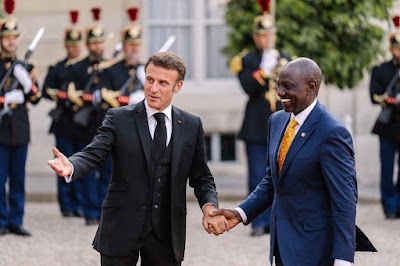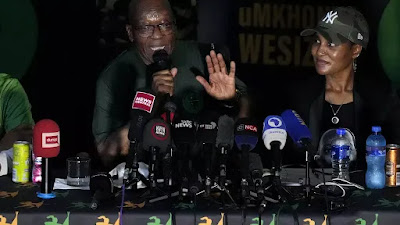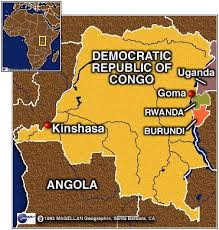Rwanda-backed Rebels in Eastern DR Congo Say They Plan to Take Their Fight to the Capital
By CHINEDU ASADU and JUSTIN KABUMBA
5:59 PM EST, January 30, 2025
GOMA, Congo (AP) — Rwanda-backed rebels who captured eastern Congo’s largest city said Thursday they want to take their fight to the far-off capital, Kinshasa, while Congo’s president called for a massive military mobilization to resist the rebellion and his defense minister rejected calls for dialogue.
In a video message on Thursday, Congo’s Defense Minister Guy Kabombo Muadiamvita said he has directed plans for any dialogue with the rebels to “be completely burned immediately.”
“We will stay here in Congo and fight. If we do not stay alive here, let’s stay dead here,” said Muadiamvita, a close ally of Congo’s president.
At a briefing where they sought to assert their control over the eastern city of Goma and surrounding territory in the neighbouring South Kivu province, the M23 rebels said they would be open to dialogue with the government, also proposed by the east African regional bloc of which Rwanda is a member.
Their motive, however, is to gain political power, Corneille Nangaa, one of the political leaders of M23, said during the briefing. “We want to go to Kinshasa, take power and lead the country,” Nangaa said. He did not indicate how the rebels planned to advance on the capital, more than 1,500 kilometers (nearly 1,000 miles) away.
Rwanda’s leader, Paul Kagame said he spoke with Angola’s President Joao Lourenco — a mediator in the conflict who also met with Congo’s leader a day earlier — and both leaders committed to working with other African countries to resolve the hostilities.
U.S. President Donald Trump described the conflict as a “very serious problem” when asked about it Thursday but declined to comment further, and a U.N. spokesman said the agency is “disturbed” by reports that neighboring Rwandan forces have crossed the border in the direction where the rebels are said to be advancing.
The M23 rebels are backed by some 4,000 troops from neighboring Rwanda, according to U.N. experts, far more than in 2012 when they first captured Goma. They are one of more than 100 armed groups vying for control in Congo’s mineral-rich east, which holds vast deposits estimated to be worth $24 trillion that are critical to much of the world’s technology.
Congolese President Félix Tshisekedi, meanwhile, called on young people to enlist massively in the military, as a crucial meeting of neighbors asked the Congolese government to talk with the rebels. Rwanda’s leader also threatened to “deal” with any confrontation with South Africa, which has complained that fighting in eastern Congo has left South African peacekeepers dead.
In his first public remarks since the M23 rebels advanced into, Goma on Monday, Tshisekedi vowed “a vigorous and coordinated response” from his forces to push back the rebels while reaffirming his commitment to a peaceful resolution.
On Thursday, he met with French Foreign Minister Jean-Noël Barrot in Kinshasa, the Congolese presidency said on X, noting that France has provided significant support to Congo in recent U.N. meetings on the issue. “(Congo) expects a little more action in the face of this crisis,” it added.
Dead bodies, looting in Goma
Goma remained largely without electricity and water on Thursday, as the bodies of several alleged government soldiers lay in the streets, horrifying residents, including children.
M23 rebels escorted some 2,000 government soldiers and police officers — who they said surrendered — to an undisclosed location, some of them singing anti-Tshisekedi songs.
The U.N. Humanitarian Coordinator in Congo said basic services are largely paralyzed in Goma, a humanitarian hub critical for more than 6 million people displaced by the conflict. “After several days of intense clashes, the city is now (faced) with massive humanitarian needs and severely impacted response capacities,” said Bruno Lemarquis, the humanitarian coordinator.
Footage from Goma showed residents carrying food items and goods looted from stores and warehouses in the city. “This is something that is going to exacerbate a dangerous cycle of violence as desperate times call for desperate measures,” the U.N. World Food Program emergency coordinator in eastern Congo, Cynthia Jones, said Thursday.
South Kivu gripped by fear
After capturing much of Goma, the rebels were advancing toward South Kivu’s provincial capital, Bukavu, causing fear and panic among residents, witnesses said Thursday.
Néné Bintou, a civil society leader, said gunshots and explosions were heard in Mukwinja, a captured town 86 miles (135 kilometers) from Bukavu.
The Congolese military has been weakened after hundreds of foreign military contractors withdrew and handed over their arms to the rebels. Residents of Goma described seeing soldiers changing into civilian clothing and dropping their guns as they crossed over the border to Rwanda or took shelter in foreign peacekeeping bases.
“The (Congolese) military bases in Bukavu have been emptied to reinforce those in Nyabibwe, Bushushu, and Nyamukubi” along the way to the capital, one youth leader said, speaking on the condition of anonymity because he was worried about his safety.
Neighbors urge talks with M23 as tensions grow
A summit of the regional East African bloc called for an immediate and unconditional ceasefire in eastern Congo and “strongly urged” Tshisekedi’s government to hold talks with the rebels. Tshisekedi was conspicuously absent from the virtual summit attended by Rwanda, also a member.
While African countries as well as the U.N. and U.S. have called for an immediate ceasefire, the risk of a regional war has increased, analysts say, exacerbated by the rebels’ advance into South Kivu and diatribes between Rwandan and South African officials. Congo is a member of the southern Africa regional bloc and also that of east Africa, whose peacekeeping force it expelled last year after deeming it ineffective.
South African President Cyril Ramaphosa blamed the “Rwanda Defense Force militia” for the fighting that has resulted in the deaths of 13 South African peacekeepers in eastern Congo. He also said his government will ensure the peacekeepers are “sufficiently supported during this critical mission.”
His comment drew an angry response from Kagame, who called the South African peacekeepers a “belligerent force” working alongside armed groups that target Rwanda. “If South Africa prefers confrontation, Rwanda will deal with the matter in that context any day,” the Rwandan leader said on the social media platform X.
Who are the M23 and what do they want?
The chaotic situation with the M23 has its roots in ethnic conflict, stretching back decades to the 1994 genocide in Rwanda, when 800,000 Tutsis and others were killed by Hutus and former militias. M23 says it is defending ethnic Tutsis in Congo. Rwanda has claimed the Tutsis are being persecuted by Hutus and others involved in the genocide. Many Hutus fled into Congo after 1994.
Unlike in 2012 when the rebels seized Congo for days, observers say their withdrawal could be more difficult now. The rebels have been emboldened by Rwanda, which feels Congo is ignoring its interests in the region and failed to meet demands of previous peace agreements, according to Murithi Mutiga, program director for Africa at the Crisis Group, a think tank.
“Ultimately, this is a failure of African mediation (because) the warning signs were always there. Kigali was adopting very bellicose rhetoric and the Congolese government was also adopting very, very aggressive rhetoric,” Mutiga said.
___
Asadu reported from Abuja. AP journalists Ruth Alonga in Goma, Jean-Yves Kamale and Christina Malkia in Kinshasa, Congo, Mark Banchereau in Paris and Edith M. Lederer in New York contributed to this report.




















